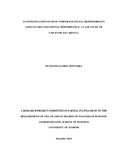| dc.description.abstract | The number of corporations carrying on activities in foreign countries or facing transnational competition is constantly growing (Enderle, 1999). Businesses are growing and are growing fast. Corporate Social Responsibility is a way that business can be responsible and profitable and yet Corporate Social Responsibility activities initiatives do not seem to work or convince the society of businesses engagement with social responsibility. The increase in expenditures to enhance the social responsibilities of corporations suggests managers find a benefit in CSR implementation‟. (Palmer, Harmony 2012) Multinational Corporations perceive and practice Corporate Social Responsibility as a corporate philanthropy aimed at addressing socio-economic development challenges. This study sought to investigate how practicing corporate social responsibility affects organizational performance at Unilever ESA. The researcher has chosen a case study research design, ideally, a case study is a research methodology that focuses on understanding the dynamics present in a management situation (Eisenhardt 1989). Data for this study was collected by means of an interview guide .The researcher used primary data to carry out the study. An interview guide that consists of open-ended questions was used to facilitate the collection of data from the respondents. The data was collected from the senior managers within the human resource, marketing, corporate communication, and finance departments who are involved in strategy formulation and implementation programs for corporate social responsibility. Data was analyzed through the use of content analysis.The study found the corporate social reasonability affects the corporate financial performance of the organization to great extent. The study revealed that corporate social responsibility enhanced organization performance through creation of demand for organization product, bring the company close to the people, increasing sale volumes and making the company socially responsible. The study established that through the CSR activities the company was able to enhance its reputation and through reputation management the organization influenced corporate organisation performance in the organization. The study found that reputation management enables a company to build positive relationships to deliver business advantage, helps companies to build customers trust thereby increasing sales, a good reputation demonstrably increases corporate worth and provides sustained competitive advantage. The study further revealed that challenges Unilever ESA Kenya faced in Corporate Social Responsibility were selection of the project which represents the interest of the community, employee involvement in project implementation, stakeholder‟s involvement in the projects, selection of project that are environment friendly and project ownership by the community | en_US |

